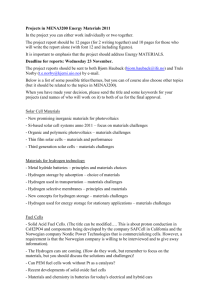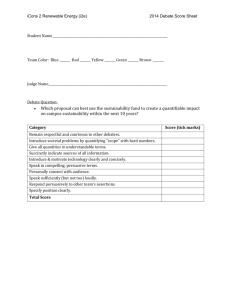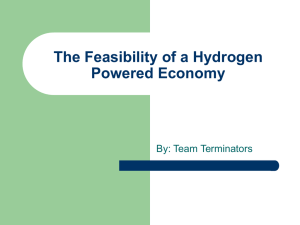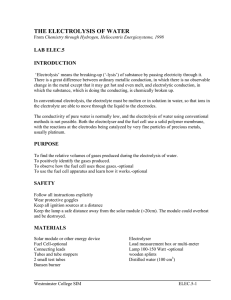FARADAY’S FIRST LAW USING A FUEL CELL INTRODUCTION
advertisement
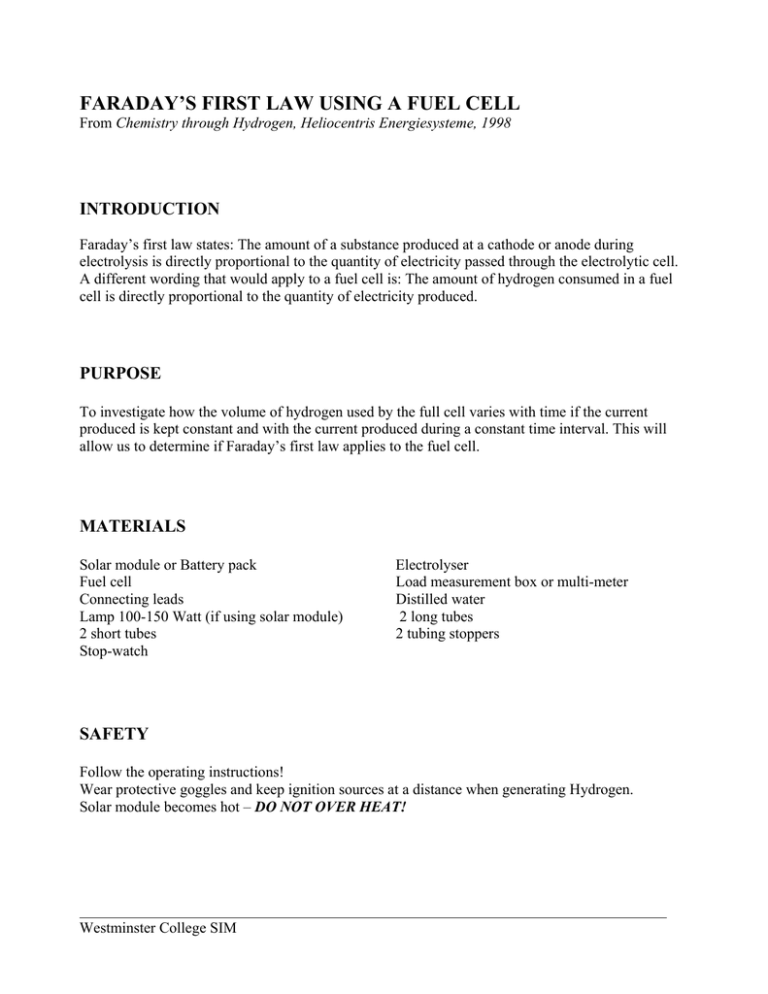
FARADAY’S FIRST LAW USING A FUEL CELL From Chemistry through Hydrogen, Heliocentris Energiesysteme, 1998 INTRODUCTION Faraday’s first law states: The amount of a substance produced at a cathode or anode during electrolysis is directly proportional to the quantity of electricity passed through the electrolytic cell. A different wording that would apply to a fuel cell is: The amount of hydrogen consumed in a fuel cell is directly proportional to the quantity of electricity produced. PURPOSE To investigate how the volume of hydrogen used by the full cell varies with time if the current produced is kept constant and with the current produced during a constant time interval. This will allow us to determine if Faraday’s first law applies to the fuel cell. MATERIALS Solar module or Battery pack Fuel cell Connecting leads Lamp 100-150 Watt (if using solar module) 2 short tubes Stop-watch Electrolyser Load measurement box or multi-meter Distilled water 2 long tubes 2 tubing stoppers SAFETY Follow the operating instructions! Wear protective goggles and keep ignition sources at a distance when generating Hydrogen. Solar module becomes hot – DO NOT OVER HEAT! Westminster College SIM Faraday’s First Law Using Fuel Cell PROCEDURE 1. Assemble the appropriate components as in figure 1 (the solar module can be replaced with an appropriate battery pack) 2. All connections must be correctly made, with correct polarity. Check with your teacher before proceeding. 3. Purge the system for 5 minutes with the switch at “OPEN” Set switch to 3Ω or place 3Ω resistor in the circuit for 3 minutes: the ammeter should indicate a current is flowing. Switch back to “OPEN” and purge for 3 more minutes. 4. Store gases in electrolyser cylinders, close the exit tubes from the fuel cell and measure the rate at which hydrogen leaks from the apparatus for a period of 5 minutes. 5. Use the gases stored in the cylinders to power the cell, set a constant current by using a resistance of 3Ω and investigate the rate at which hydrogen is consumed. (record the volume every 4 minutes) 6. Refill the storage cylinders with hydrogen and using different resistances investigate how the volume of hydrogen consumed varies with the current produced by the cell. (use a constant time interval, say 2 minutes) 7. Draw a circuit diagram and explain its arrangement. 8. Construct a data table and record all data (either on paper or a spreadsheet). 9. Use your data to plot graphs of a. volume of H2 consumed vs. time (at constant current) b. volume of H2 consumed vs. current (at a constant time interval). Westminster College SIM Faraday’s First Law Using Fuel Cell QUESTIONS 1. Write equations for the reactions occurring at the anode and cathode in the electrolyser and fuel cell. 2. Explain, based on these equations, why you would or would not expect Faraday’s law to apply to a fuel cell. 3. Use your graphs to test the validity of Faraday’s first law for the fuel cell. 4. Evaluate the techniques used and suggest any ways in which the experiment procedure might be improved. Westminster College SIM

